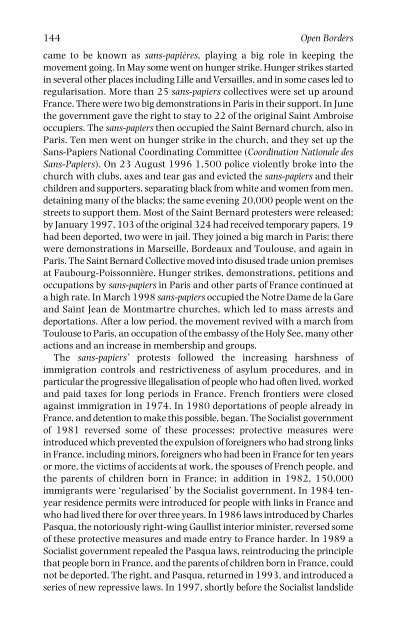Open%20borders%20The%20case%20against%20immigration%20controls%20-%20Teresa%20Hayter
Open%20borders%20The%20case%20against%20immigration%20controls%20-%20Teresa%20Hayter
Open%20borders%20The%20case%20against%20immigration%20controls%20-%20Teresa%20Hayter
Create successful ePaper yourself
Turn your PDF publications into a flip-book with our unique Google optimized e-Paper software.
144 Open Borders<br />
came to be known as sans-papières, playing a big role in keeping the<br />
movement going. In May some went on hunger strike. Hunger strikes started<br />
in several other places including Lille and Versailles, and in some cases led to<br />
regularisation. More than 25 sans-papiers collectives were set up around<br />
France. There were two big demonstrations in Paris in their support. In June<br />
the government gave the right to stay to 22 of the original Saint Ambroise<br />
occupiers. The sans-papiers then occupied the Saint Bernard church, also in<br />
Paris. Ten men went on hunger strike in the church, and they set up the<br />
Sans-Papiers National Coordinating Committee (Coordination Nationale des<br />
Sans-Papiers). On 23 August 1996 1,500 police violently broke into the<br />
church with clubs, axes and tear gas and evicted the sans-papiers and their<br />
children and supporters, separating black from white and women from men,<br />
detaining many of the blacks; the same evening 20,000 people went on the<br />
streets to support them. Most of the Saint Bernard protesters were released;<br />
by January 1997, 103 of the original 324 had received temporary papers, 19<br />
had been deported, two were in jail. They joined a big march in Paris; there<br />
were demonstrations in Marseille, Bordeaux and Toulouse, and again in<br />
Paris. The Saint Bernard Collective moved into disused trade union premises<br />
at Faubourg-Poissonnière. Hunger strikes, demonstrations, petitions and<br />
occupations by sans-papiers in Paris and other parts of France continued at<br />
a high rate. In March 1998 sans-papiers occupied the Notre Dame de la Gare<br />
and Saint Jean de Montmartre churches, which led to mass arrests and<br />
deportations. After a low period, the movement revived with a march from<br />
Toulouse to Paris, an occupation of the embassy of the Holy See, many other<br />
actions and an increase in membership and groups.<br />
The sans-papiers’ protests followed the increasing harshness of<br />
immigration controls and restrictiveness of asylum procedures, and in<br />
particular the progressive illegalisation of people who had often lived, worked<br />
and paid taxes for long periods in France. French frontiers were closed<br />
against immigration in 1974. In 1980 deportations of people already in<br />
France, and detention to make this possible, began. The Socialist government<br />
of 1981 reversed some of these processes; protective measures were<br />
introduced which prevented the expulsion of foreigners who had strong links<br />
in France, including minors, foreigners who had been in France for ten years<br />
or more, the victims of accidents at work, the spouses of French people, and<br />
the parents of children born in France; in addition in 1982, 150,000<br />
immigrants were ‘regularised’ by the Socialist government. In 1984 tenyear<br />
residence permits were introduced for people with links in France and<br />
who had lived there for over three years. In 1986 laws introduced by Charles<br />
Pasqua, the notoriously right-wing Gaullist interior minister, reversed some<br />
of these protective measures and made entry to France harder. In 1989 a<br />
Socialist government repealed the Pasqua laws, reintroducing the principle<br />
that people born in France, and the parents of children born in France, could<br />
not be deported. The right, and Pasqua, returned in 1993, and introduced a<br />
series of new repressive laws. In 1997, shortly before the Socialist landslide


